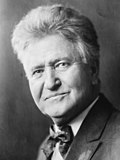| |||||||||||||||||||||||||||||||||||||
| |||||||||||||||||||||||||||||||||||||
 County Results
Coolidge 40-50% 50-60% 60-70% 70-80%
| |||||||||||||||||||||||||||||||||||||
| |||||||||||||||||||||||||||||||||||||
| Elections in Kansas |
|---|
 |
The 1924 United States presidential election in Kansas was held on November 4, 1924, as part of the 1924 United States presidential election. State voters chose ten electors to the Electoral College, who voted for president and vice president.
A rapid recovery from the depression of 1920 and 1921, despite major Republican losses during the 1922 House elections[1] placed the Republican Party – who gained a record popular-vote majority in the 1920 election – in a secure position despite the death of President Warren G. Harding in 1923. Rises in wages and ebbing of discontent further solidified the GOP's hold on power.[1] More critically, the Democratic Party was mortally divided between its rural Southern faction led by William Gibbs McAdoo and its white ethnic urban northeastern faction led by New York Governor Al Smith.[2] The revived Ku Klux Klan supported the rural faction and was in favor of Prohibition, whereas the white ethnic faction was firmly against the anti-Catholic Klan and opposed to Prohibition. A fierce debate ensued that saw a compromise candidate, former Congressman John W. Davis of West Virginia, nominated after one hundred and three ballots in hot summer weather at Madison Square Garden.[3] Although West Virginia was a border state whose limited African-American population had not been disenfranchised as happened in all former Confederate States,[4] Davis did share the extreme social conservatism of Southern Democrats of his era. He supported poll taxes, opposed women's suffrage, and believed in strictly limited government with no expansion in nonmilitary fields.[5]
The conservatism of Coolidge and Davis made it inevitable that aging Wisconsin maverick Robert M. La Follette would mount a third-party challenge – which La Follette had planned even before the Democratic Convention.[6] La Follette was formally nominated on July 4 by the "Conference for Progressive Political Action" and developed a platform dedicated to eliminating child labor and American interference in Latin American political affairs, along with a formal denunciation of the Ku Klux Klan.[7] La Follette also proposed major judicial reforms including amendments allowing Congress to override judicial review and to re-enact laws declared unconstitutional.[8] La Follette also called for the election of federal judges for ten-year terms.[9]
- ^ a b Ayers, Edward; Gould, Lewis; Oshinsky, David and Soderlund, Jean; American Passages: A History of the United States, Volume II: Since 1865, p. 677 ISBN 0547166354
- ^ Grantham, Dewey; The South in Modern America: A Region at Odds, p. 106 ISBN 1610753895
- ^ Paulson, Arthur C.; Realignment and Party Revival: Understanding American Electoral Politics at the Turn of the Twenty-First Century, p. 51 ISBN 0275968650
- ^ Ranney, Joseph A.; In the Wake of Slavery: Civil War, Civil Rights, and the Reconstruction of Southern Law; p. 141 ISBN 0275989720
- ^ Newman, Roger K.; The Yale Biographical Dictionary of American Law, p. 153 ISBN 0300113005
- ^ Richardson, Danny G.; Others: "Fighting Bob" La Follette and the Progressive Movement: Third-Party Politics in the 1920s, p. 180 ISBN 0595481264
- ^ Richardson; Others, pp. 182-183
- ^ Moreno, Paul D.; The American State from the Civil War to the New Deal: The Twilight of Constitutionalism and the Triumph of Progressivism, p. 205 ISBN 1107067715
- ^ Parrish, Michael E.; Anxious Decades: America in Prosperity and Depression, 1920-1941, pp. 70-71 ISBN 0393311341


